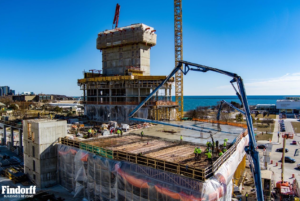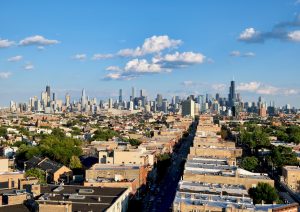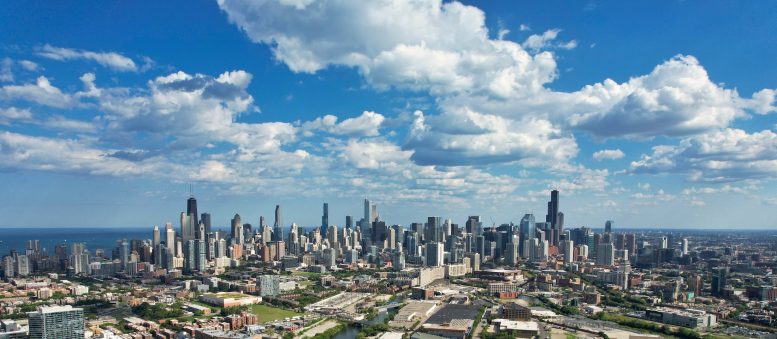Illinois’ governing board overseeing building standards has chosen not to adopt the all-electric code, which would have made electric systems mandatory in new construction. Chicago and surrounding areas to have chosen to limit natural gas usage in new buildings. Initially integrated into the Illinois stretch energy code, the rejection stemmed from concerns regarding potential legal liabilities for communities according to CarbonCredits.com.

March 2023 construction images of The Couture via J.H. Findorff & Son
Despite the rejection, Illinois will continue to pursue sustainable solutions in building construction. The Energy Conservation Advisory Council has developed a stretch code in line with the state’s Climate and Equitable Jobs Act, aiming to surpass energy conservation standards.

Chicago Skyline Photo by Jack Crawford
Illinois remains focused on its aim to achieve 100 percent clean energy by 2050, with future updates offering opportunities to reconsider issues and progress towards a more environmentally friendly future.
Subscribe to YIMBY’s daily e-mail
Follow YIMBYgram for real-time photo updates
Like YIMBY on Facebook
Follow YIMBY’s Twitter for the latest in YIMBYnews


All electric is a fun goal, but it’s severely unrealistic if the main goal is achieving affordable housing.
Upon working on schools and housing in California, nothing that is 100% electric is able to financed by the client solely. Almost every project had some outside funding that was either a tax credit or came from a fund of some type. Which, if a gas tax or some other charge helped pour into that fund, then maybe it can be a good way to incentivize. As if now, we need less burdens on tax payers and rebuild our economics. All electric is currently unsustainable publicly.
What Illinois needs first: get the nuclear power plants out of the red and have their futures secured, FAR too many coal power plants still chugging, there’s an insane amount of warehouses that have 0 solar panels on the roofs (in the thousands), and get a more established EV charging grid.
And make sure the grid can handle it all. Look at substation battery storage (keep it close) for when too much electricity is produced due to surge in solar panels, as is a problem in CA.
Going all electric is at best a pipe dream, but more realisticly a nightmare we are running towards. Talk to an electrician, our grid wont support 25% more EVs let alone a city thats all electric. Talk to Cali about rolling blackouts. Talk to Texas about Freezolla. Its a lefty joke, and we are the punchline.
Rolling blackouts in CA is a joke Fox News peddled to fear monger the simpletons.
If this is a narrative you want to pursue, others should not take this comment seriously.
I lived in CA the past 7 years. The only time the power went out, construction in my neighborhood, insane massive rain storms that took out hundreds of trees (twice in separate years), and minor preventative measures for local forest fires. They are burying hundreds of power lines in fire-risk areas. And they sent WARNINGS to minimize power usage when heatwaves came rolling in so that the grid didn’t get overwhelmed. Not once did the power go out, they just charged more to incentivize you be more passive with the AC and use of other appliances.
Texas is the only one that decided a changing climate doesn’t work with their private interests and scoffed at the idea of being prepared rather than reactionary.
As a landlord, I was in the process of planning a reconversion for a 30-unit property. However, six months into the project, I was informed that I either had to go all-electric or have the electric service system “ready,” which would increase the electrical bid cost by an additional 40%. Consequently, I’ve decided to scrap the entire project altogether. It’s evident that Chicago doesn’t prioritize facilitating business, making it extremely challenging.
Someone gave you bad information. The Chicago Clean and Affordable Buildings Ordinance (AKA the “All Electric” Requirement) is still in the proposal phase (as of April 1) and would take a year to go into effect after a successful vote in the city council. At the same time, the high-level summary says it applies to new construction buildings or major additions that increase square footage of an existing structure only.
I’m curious people’s thoughts on Triangle Square since it’s all electric and has been open for a few years now. I had heard (contractor gossip, take with a grain of salt) that the monthly electric bills are over $400.00/month/unit. Add this to the already hefty rent, and it sounds like they have had a ton of difficulty getting anyone to renew their leases after the first year.
That could be the total utility bill, including lots of other things apartments like to tack on (not just water but trash, pest control, etc.). Some places are including internet now too. I’m just speculating, but if it included all utilities, it’s not as high as it initially seems.
I don’t live in Triangle Square, I live in Marina Tower, which is all electric (ahead of its time by 60 years), and my electric bill is between $35 in summer and $180 in winter. This is for a 1BR. I use my electric heat more than many. I’ve heard of people not turning on their heat at all in the winter. That being said, ComEd needs to update their systems before the codes force this change. I’m an architect and ComEd has had to upgrade the electrical system for an entire neighborhood so that one building can add an elevator. And new transformers have a lead time of over a year. I’m all for the change eventually, but there needs to be upgrades on the infrastructure side as this happens in a gradual way.
Agreed. The grid, energy management, how homes(small scale generation) can sell back to the grid, storage at substations and the like need to be looked at and expanded so there is the ability to handle more usage down the line. All the talk now of “let’s go electric” without thinking about the future is leading to a straw that broke the camels back scenario.